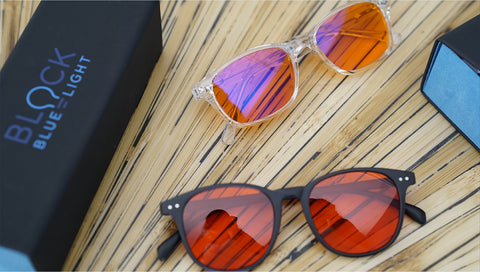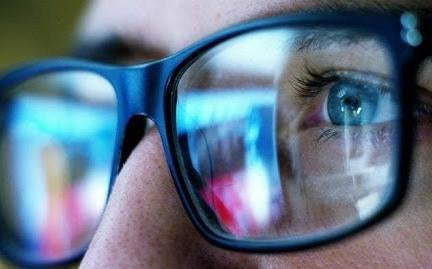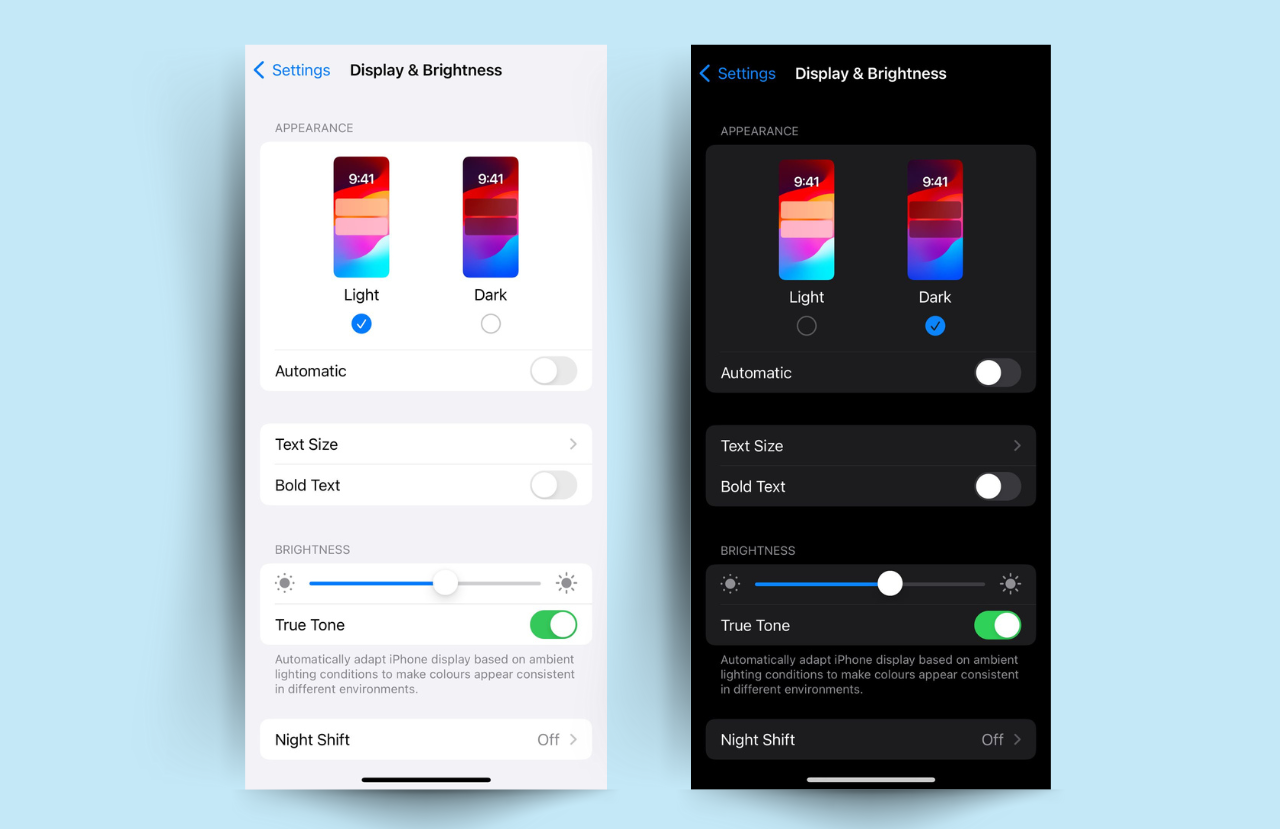Do you feel extremely tired after a long day at the office? Exposure to blue light from computer screens can make your eyes feel irritated or dry, and lead to eye strain. Long hours in front of your screen contributes to issues such as fatigue, eye strain, headaches, migraines, and even permanent eye damage. This has a significant impact on your health and wellbeing. Find out about the advantages and benefits from using computer glasses, and do the right thing for your eyes.
What is Blue Light?
Natural blue light is closely linked to alertness and awareness. Blue light from the sun wakes us up in the morning, and the absence of blue light tells us when it’s time to sleep. Just go outside on a sunny day, and you’ll realize that natural blue light increases brain activity, makes you feel more awake, and improves your mood.
Sunlight includes all the visible light, such as blue, green, red, and orange light. It also includes invisible infrared and ultraviolet light. Blue light on its own is another story.
Sources of blue light include:
- Computer screens
- Tablets
- Smart phones
- LED lights
- Fluorescent lights
- Plasma screen TVs
- Fridge lights
All these sources of blue light can hurt your eyes, and lead to pain, headaches, or even retinal damage. Artificial blue light, with all other infrared and ultraviolet light filtered out, can be very harmful to your eyes and your health. For more detail on what blue light is please read our article What Is Blue Light?

The Dangers of Harmful Blue Light
When you’re exposed to artificial blue light, you’ll notice a lot of negative effects to your overall health and wellbeing. Excessive exposure to blue light can make your body feel tired, dehydrate you, and even affect your ability to focus and think clearly.
If you’re exposed to blue light at night, your body will struggle to produce melatonin, the hormone that signals to your body that it’s time to wind down and go to sleep. You’ll disrupt your natural sleep cycles, and you’ll have a hard time forming healthy habits around sleep.
Look around your home or office, and notice all the screens. From your desktop at the office and your laptop at home, to your TV, phone, and tablet, screens are all around you. We’ve come to rely on technology more than ever before for work, social activities, education, and entertainment, and this could be dangerous to our eyes.
Even a few hundred years ago, most people worked outside, and many had very active jobs. They’d come home after a long day at work, sit around the fire in the dusk, and go to bed early. Now, many of us work indoors, often sitting down in front of a computer. Adults spend more than 11 hours per day on their smartphone, watching TV, or staring at a computer monitor.
Children spend more than 3 hours watching TV, and this harms their health. Too much screen time can make it harder for kids to fall asleep at night, increase their risk of weight gain, or even lead to anxiety and depression. The blue light from computers and devices can also harm their eyesight.
For more information on how blue light is effecting kids please read our articles How Blue Light Is Impacting Your Child’s Development, Health, & Sleep and How To Avoid Damaging Your Children’s Eyes From Excessive Blue Light Exposure
Blue Light Exposure and Your Eyes
When you spend long hours in front of the computer, you have a high risk of developing eye strain, or suffering from blue light eye damage. Office workers often have trouble focusing their eyes on the screen, have blurred vision, or find it difficult to concentrate and complete tasks. When you stare at a computer all day, your eyes struggle to remain focused, and the light will cause your pupils to dilate for far too many hours. You may also experience redness in the eye, have some eye watering, or even feel dizzy.
Chronic exposure to blue light can lead to eye strain, itchy or irritated eyes, severe headache, and migraines. Blue light eye damage is more common than you think. In fact, 53% of computer users complain of headaches and burning eyes, and 48% report having tired eyes. Blurry or double vision is a common sign of blue light eye damage, and if you have sore eyes or headaches, it’s time to evaluate your screen usage.

Blue light eye damage can be a temporary discomfort, but it often leads to permanent vision impairment. Blue light from computers can speed the onset of presbyopia or vision loss, and your eyes will struggle to focus on things close by. It will also increase your risk of macular degeneration, and damage to the retinal cells in your eyes.
Eye problems are more common now than ever before. In the United States, 33.1% of adults have myopia, or nearsightedness, while 41.9% of children have myopia. Meanwhile, in China 65.48% of high school students have myopia. Blue light exposure has a hand in the high rates of myopia, and all that screen time is damaging your eyes.
All About Blue Light Filter Glasses
 Aren’t glasses only worn to correct a vision problem? Not exactly. Glasses can also be worn to protect your eyes, such as safety glasses at work, or sunglasses when you’re outside in bright light. Computer glasses aren’t worn to correct your vision, they’re designed to mitigate eye strain, and help you get through your workday comfortably. They’ll also protect your eyes from blue light eye damage and relieve eye irritation.
Aren’t glasses only worn to correct a vision problem? Not exactly. Glasses can also be worn to protect your eyes, such as safety glasses at work, or sunglasses when you’re outside in bright light. Computer glasses aren’t worn to correct your vision, they’re designed to mitigate eye strain, and help you get through your workday comfortably. They’ll also protect your eyes from blue light eye damage and relieve eye irritation.
If you work in front of a computer all day then go home and watch TV, you’ve felt the effects of blue light eye damage. By the end of the day, your eyes feel tired and stressed from all that screen time, and you dread getting up in the morning to do it all again.
These type of blue light glasses change all of that. These glasses look like regular glasses, but they do something incredible. They filter out harmful blue light while still letting you see normally. You’ll even be able to perform detailed tasks on your computer, such as video editing, or design work, without experiencing any distortions. In fact, wearing the glasses will help you be even more creative by relieving headaches and eye strain.
Computer glasses filter out harmful blue light and keep your eyes safe so you can work on a screen without discomfort. They reduce artificial blue light in the blue light wavelengths between 400-490nm, and alleviate eye strain, prevent sore eyes, and control headaches. You won’t have to struggle with blurred vision, and you’ll have peace of mind knowing you’re doing the right thing for the health of your eyes.
These anti-blue light glasses will provide relief without distorting the color on your screen. They are made for anyone who spends long hours in front of screens, and you can find glasses made for either daytime or nighttime use.
Not All Blue Light Glasses Are The Same
There are now so many different brands and options of blue light glasses on the market today but how do we know which are the best to obtain all the benefits?
The best blue light filter glasses need to reduce the blue light frequencies that are emitted by LEDs and other devices which peaks at 450nm. The problem with most computer glasses available is they only focus on reducing blue/violet light between 380-420nm and only do so by approx. 20%. The issue with this is that the frequencies of 380nm – 420nm blue light is not present in LEDs or any other electronic devices, so they really aren’t filtering any artificial light at all! Most of the big brands glasses will only filter to this specification which is completely useless, the same also applies for the blue light filter coated applied by optometrists. So be very care before making an investment into computer glasses as they are not all created equal.

We go into much more detail about the differences in all blue light glasses and which ones are the best in our article Not All Blue Light Blocking Glasses Are Created Equal, Which Blue Light Glasses Are The Best.
The Best Glasses For Blue Light Protection
When looking for a pair of anti fatigue glasses you must make sure they sufficiently filter blue light over the entire blue light spectrum (400nm – 500nm), and more specially they are filtering blue light by approx. 50% at 450nm. This is where most of the spike of blue light from LEDs is emitted so it’s essential the computer glasses filter this exact frequency sufficiently to protect your eyes. Using glasses to this standard this will allow the blue light spike from LEDs and electronic devices to be brought back into balance with the other colours in the spectrum to eliminate all the harmful effects excessive blue light from computers and other devices causes.

Benefits From Using Computer Glasses
Using blue light glasses will help you protect your eyesight from harmful blue light. You easily maintain your energy levels, and feel clear-headed throughout the day. Anti-blue light glasses will reduce your risk of headaches, and even improve your posture!
Blue Light Reduction
Not only do blue filter glasses reduce blue light from your computer screen, they’ll also protect your eyes from harmful office light, such as fluorescent or LED lighting that emits a lot of blue light. Computer glasses limit the amount of blue light the reaches your eyes, either from computer screens, smartphones, or the overhead lights. Blue Filter glasses will maintain the contrast on screen while reducing the harmful blue light emanating from your computer screen.
Healthy Vision
These type of glasses will help you maintain healthy vision. You won’t have to strain to see the computer screen, turn up the brightness too high, hunch forwards to cut the glare, or expose your eyes to unhealthy blue light. With computer glasses, you can avoid eye problems, and reduce your risk or myopia. You’ll also reduce the risk of macular degeneration and maintain your vision.
Reduced Digital Eye Strain
After a few hours in front of a screen, you’ll notice the effects of digital eye strain. Symptoms include irritated or dry eyes, blurred vision, and overall eye fatigue. According to The Vision Council, 59% of adults report having digital eye strain! Anti-blue light glasses will filter out the harmful blue light that causes damage, and let you see normally without experiencing digital eye strain
Reduced Glare
The glare bouncing off your screen can make it even harder to see the screen, and you may have to turn up the brightness, casting even more blue light onto your face and into your eyes. Your eyes will strain to see past this glare, and you’ll experience blurry vision and eye ache. Anti blue glasses can cut this glare and stop your eyes from dilating with the brightness. You’ll be able to see normally without that exhausting glare. Anti-glare and anti-reflective coatings, along with the anti-blue lenses, will protect your eyes from glare and you’ll end the workday without eye strain.
Reduced Headaches and Migraines
Have you been suffering from chronic headaches or migraines? Both headaches and migraines can be caused by blue light coming from your screens. Migraines cause unbearable pain, make it difficult to focus on tasks, and will have you reaching for your Tylenol bottle every day. Blue light filter glasses will reduce headaches and migraines, and let you work comfortably in front of your computer without any discomfort.
Increased Productivity
Another benefit of wearing these glasses is increased productivity. When your head aches and your eyes feel sore, you’ll have a hard time focusing on tasks or being productive. Computer glasses will increase both your productivity and your accuracy, and you’ll accomplish tasks faster than ever before. You’ll also have more time to spend with your loved ones, and can leave the computer sooner.
Improved Posture
What do you do when you can’t see the screen? Many of us lean in closer to get a better look, or hunch over our screens to change the angle of the glare. Computer glasses can improve posture, and let you straighten your back when seated at your desk. You can sit at a comfortable distance from the screen without straining to see, and this will reduce headaches and relieve the tension in your neck and back.

Solutions for Avoiding Blue Light Eye Damage
To enjoy all the advantages and benefits from using computer glasses, our ScreenTime Premium Blue Light Computer Glasses will filter out harmful blue light, and protect your eyes from blue light eye damage. They filter 50% of the most harmful blue light coming from your screen, while allowing some blue light to keep you alert throughout the day. The ClearBlue lenses reduce all harmful blue light from computers, digital devices, or other light sources. You’ll see your screen clearly, and know your eyes are safe.
Our ScreenTime glasses won’t distort the colors on screen, or change the way you experience the display, but you will be protecting your health, and filtering out the harmful artificial blue light. Anti-blue light glasses will filter the harmful blue light wavelengths during the day, reducing the excessive over exposure and bringing the blue light back into balance with a closer resemblance to natural light.
BlockBlueLight also make ScreenTime Fitover computer glasses for anyone who already wears glasses or corrective lenses. They fit over your regular glasses, so you’ll get the best in clear vision and blue light protection.
Blue Light Blocking Glasses for Nighttime

Are you a night owl? If you’re on your screen a lot in the evening or night, watching TV, or have any overhead lighting on, you need to use Blue Light Blocking Glasses that will block 100% of the blue light in your environment. These are great for those midnight projects, watching TV late at night, or using any digital device before bed.
Children’s Solutions
For the children in your life, we also have Kids Screentime glasses that will keep your kids eyes safe. Children’s eyes aren’t ready for all that harsh light, and blue light from computers and screens is very likely to disrupt their development and their sleep habits. These glasses, designed for children 3 and up, will protect children’s eyesight during crucial development years.
Conclusion
Do the right thing for your health, and find out more about the blue light from computers that’s harming your eyes. Say goodbye to eye strain, tired eyes, and headaches! Anti-blue light glasses will let you work comfortably, concentrate easily, and fall asleep as soon as your head hits the pillow. Get all the advantages and benefits from using computer glasses, and find your pair today.
Sources
4 ways computer glasses help students alleviate eyestrain. (2020). blogs.harvard.edu/blockchain/4-ways-computer-glasses-help-students-alleviate-eyestrain/.
Blue light exposed. (2020). bluelightexposed.com/#bluelightexposed.
Christos T. et al. (2018). Myopia prevalence and risk factors in children. ncbi.nlm.nih.gov/pmc/articles/PMC6120514/.
Digital eye strain. (2020). thevisioncouncil.org/content/digital-eye-strain.
Fottrell Q. (2018). People spend most of their waking hours staring at screens. marketwatch.com/story/people-are-spending-most-of-their-waking-hours-staring-at-screens-2018-08-01.
Gianluca T. et al. (2016). Effects of blue light on the circadian system and eye physiology. ncbi.nlm.nih.gov/pmc/articles/PMC4734149/#r64.
Li Y. et al. (2017). The increasing prevalence of myopia in junior high school students in the Haidian District of Beijing, China: a 10-year population-based survey. ncbi.nlm.nih.gov/pmc/articles/PMC5468969/.
Screen time and children. (2019). medlineplus.gov/ency/patientinstructions/000355.htm.
Shantakumari N. (2014). Computer use and vision-related problems among university students in Ajman, United Arab Emirate. ncbi.nlm.nih.gov/pmc/articles/PMC3991951/.
Vitale S. et al. (2008). Prevalence of refractive error in the United States, 1999-2004. ncbi.nlm.nih.gov/pubmed/18695106/.







